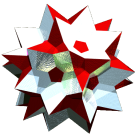complex polyhedron x2-3-o2-4-op,
βp3


© p=3 p=4 p=5
- general polytopal classes:
- complex polytopes
links


| Acronym | ... |
| Name |
Shephard's p-generalised octahedron, complex polyhedron x2-3-o2-4-op, βp3 |
| |
| Circumradius | 1/sqrt(2) = 0.707107 |
| Vertex figure | x2-4-op |
| Coordinates | (εpn, 0, 0)/sqrt(2) & all permutations, each for any 1≤n≤p, where εp=exp(2πi/p) |
| Dual | xp-4-o2-3-o2 |
| Face vector | 3p, 3p2, p3 |
| Especially | x2-3-o2-4-o3 (p=3) x2-3-o2-4-o4 (p=4) x2-3-o2-4-o5 (p=5) |
| Confer |
|
|
External links |


|
Those complex polyhedra are somewhat special in so far as both their edges as well as their faces remain mere real polytopes. For p=2 it surely becomes fully depenerate and then is nothing but the real space oct. For larger values of p however, the vertex figure becomes the complex polygon x2-4-op. Thence it not only is the formal dual of the complex polytope xp-4-o2-3-o2, but also its real space embedding is still 6-dimensional and is the dual of that there given one, i.e. the tegum poduct of 3 (fully orthogonal) p-gons. In fact, the to be chosen triangles therefrom are just those lacing triangles, which have one vertex on each of those p-gons. For the provided metrical properties the overall scaling of that embedding is to be chosen such that those lacing edges become unity.
The incidence matrix thence is simply the same as for Shephard's p-generalised cube, just rotated 180° around.
Incidence matrix according to Dynkin symbol
x2-3-o2-4-op . . . | 3p ♦ 2p | p2 ------------+----+-----+--- x2 . . | 2 | 3p2 | p ------------+----+-----+--- x2-3-o2 . | 3 | 3 | p3
© 2004-2026 | top of page |